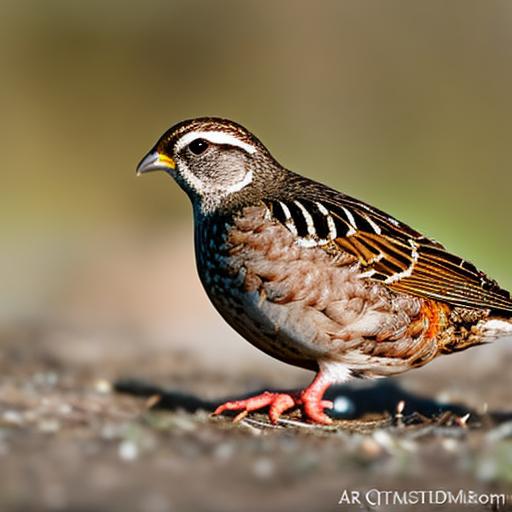Keeping quail in urban environments has become increasingly popular in recent years, as more and more people seek to connect with their food sources and live a more sustainable lifestyle. Quail are an excellent choice for urban dwellers who want to raise their own eggs and meat, as they require minimal space and are relatively low-maintenance. In addition to providing a source of fresh, nutritious eggs, quail also make charming and entertaining pets, with their endearing personalities and distinctive calls. Whether you have a small backyard, a rooftop garden, or even just a balcony, there are plenty of options for creating a suitable habitat for quail in an urban setting. In this article, we will explore the ins and outs of keeping quail in the city, from choosing the right breed to navigating local regulations and ordinances.
Quail are an ideal choice for urban living due to their small size and quiet nature. They are much smaller than chickens, making them well-suited to small spaces, and their gentle cooing is unlikely to disturb neighbors. With the right setup, quail can thrive in urban environments, providing their owners with a sustainable source of eggs and meat. Additionally, quail are relatively low-maintenance compared to other poultry, making them an attractive option for urban dwellers with busy lifestyles. With the right knowledge and preparation, keeping quail in the city can be a rewarding and enjoyable experience.
Key Takeaways
- Quail can be kept in urban environments with proper planning and care
- Consider breeds like Coturnix quail for their small size and quiet nature
- Utilize vertical space and consider a DIY cage for a small quail habitat
- Provide a balanced diet and clean living conditions for urban quail
- Research local regulations and seek permits before keeping quail in the city
- Regular health checks and socialization are important for urban quail
- Join local groups like the Chicago Urban Quail Keepers for support and resources
Choosing the right quail breed for urban living
When it comes to choosing the right quail breed for urban living, there are several factors to consider. Different breeds of quail have different characteristics and requirements, so it’s important to choose a breed that is well-suited to your specific living situation. Some popular quail breeds for urban environments include Coturnix (also known as Japanese) quail, Bobwhite quail, and Button quail. Coturnix quail are one of the most popular choices for urban dwellers, as they are small, quiet, and prolific layers. They come in a variety of colors and are known for their gentle disposition, making them a great choice for first-time quail keepers. Bobwhite quail are another popular option, known for their striking appearance and distinctive call. While they are slightly larger than Coturnix quail, they are still well-suited to small spaces and can be a great choice for urban homesteaders. Button quail are the smallest of the three breeds, making them an excellent choice for those with very limited space. They are also known for their colorful plumage and entertaining behavior, making them a popular choice for urban quail enthusiasts.
In addition to considering the size and temperament of different quail breeds, it’s also important to think about your specific goals for keeping quail. If you are primarily interested in raising quail for eggs, then Coturnix quail may be the best choice for you, as they are prolific layers and can start laying eggs as early as six weeks old. If you are interested in raising quail for meat, then Bobwhite quail may be a better option, as they are larger and have a more substantial amount of meat on their bones. Button quail are often kept more for ornamental purposes, as they are not as prolific layers or meat producers as Coturnix or Bobwhite quail. Ultimately, the right breed for you will depend on your specific living situation and goals for keeping quail in an urban environment.
Setting up a quail habitat in a small space
Setting up a quail habitat in a small space requires careful planning and consideration of the specific needs of these birds. While quail do not require as much space as other poultry, it’s still important to provide them with a safe and comfortable environment where they can thrive. One of the most important considerations when setting up a quail habitat in a small space is providing adequate ventilation and airflow. Quail produce a significant amount of ammonia in their droppings, so it’s crucial to ensure that their living space is well-ventilated to prevent respiratory issues. This can be achieved by using a well-ventilated coop or cage, or by providing ample opportunities for fresh air to circulate through the space.
Another key consideration when setting up a quail habitat in a small space is providing appropriate bedding and nesting materials. Quail need a soft, dry surface to walk on and lay their eggs, so it’s important to provide them with suitable bedding such as straw, wood shavings, or sand. Additionally, providing nesting boxes or areas where the quail can lay their eggs will help to keep them comfortable and encourage healthy egg production. In a small space, it’s important to maximize the use of vertical space by providing elevated perches or platforms for the quail to roost on. This can help to create more usable space within the habitat and provide the quail with opportunities for exercise and enrichment.
Feeding and caring for quail in an urban setting
Feeding and caring for quail in an urban setting requires attention to their specific dietary needs and daily care requirements. Quail have relatively simple dietary needs, primarily consisting of a high-quality commercial feed supplemented with fresh greens and occasional treats. It’s important to provide quail with a balanced feed that is specifically formulated for their nutritional requirements, as this will help to ensure that they receive all the essential vitamins and minerals they need to stay healthy. Additionally, providing access to fresh greens such as lettuce, spinach, and kale can help to supplement their diet and provide them with additional nutrients.
In addition to providing appropriate nutrition, it’s also important to ensure that quail have access to clean water at all times. Quail can be quite messy drinkers, so it’s important to provide them with waterers that are easy to clean and refill regularly. In an urban setting, it’s important to be mindful of potential predators that may pose a threat to your quail. Depending on your specific living situation, this may include neighborhood cats, dogs, or even birds of prey. It’s important to take steps to secure your quail habitat and protect them from potential predators, such as using wire mesh or netting to cover their outdoor enclosure or coop.
Dealing with city regulations and ordinances for keeping quail
Dealing with city regulations and ordinances for keeping quail in an urban environment can be one of the biggest challenges for prospective quail keepers. While many cities have regulations in place regarding the keeping of poultry, these regulations can vary widely from one location to another. Before embarking on your quail-keeping journey, it’s important to thoroughly research the local regulations and ordinances in your area to ensure that you are in compliance with any relevant laws. Some cities may have specific restrictions on the number of birds you can keep, the type of housing you can provide for them, or even whether or not you are allowed to keep poultry at all.
In some cases, it may be necessary to apply for permits or variances in order to legally keep quail in an urban environment. This process can be time-consuming and may require you to jump through various bureaucratic hoops, but it’s an essential step in ensuring that you can keep your quail without running afoul of the law. Additionally, it’s important to consider the potential impact of your quail-keeping activities on your neighbors. While quail are generally quiet and unobtrusive animals, it’s still important to be considerate of those who live nearby and take steps to minimize any potential disturbances.
Tips for keeping quail healthy and happy in a city environment

Keeping quail healthy and happy in a city environment requires attention to their specific needs and careful management of their living conditions. One of the most important factors in keeping quail healthy is providing them with a clean and comfortable living environment. This includes regular cleaning of their coop or cage, providing fresh bedding and nesting materials, and ensuring that they have access to clean water at all times. Additionally, it’s important to monitor the health of your quail regularly and be on the lookout for any signs of illness or distress.
Another key aspect of keeping quail healthy and happy in a city environment is providing them with opportunities for exercise and enrichment. Quail are active birds that enjoy scratching around in the dirt and dust bathing, so it’s important to provide them with opportunities for these natural behaviors. This can be achieved by providing them with access to an outdoor run or by providing them with suitable enrichment activities within their living space. Additionally, providing opportunities for social interaction with other quail can help to keep them mentally stimulated and prevent boredom.
It’s also important to be mindful of potential sources of stress for your quail in a city environment. This may include loud noises, bright lights at night, or exposure to potential predators. Taking steps to minimize these stressors can help to keep your quail calm and content in their urban home. Finally, it’s important to stay informed about best practices for keeping quail healthy and seek out resources such as local poultry clubs or online forums where you can connect with other quail enthusiasts and share knowledge and experiences.
Connecting with local quail enthusiasts and resources in Chicago
For those interested in keeping quail in Chicago, there are several resources available for connecting with local enthusiasts and accessing information about best practices for keeping these birds in an urban environment. One valuable resource is the Chicago Poultry Enthusiasts group, which provides support and information for those interested in keeping poultry in the city. This group offers regular meetings, workshops, and online forums where members can connect with other poultry enthusiasts, share knowledge and experiences, and access resources related to keeping poultry in an urban setting.
Another valuable resource for those interested in keeping quail in Chicago is the Chicago Poultry Swap Meet, which provides an opportunity for poultry enthusiasts to buy, sell, or trade birds and related supplies. This event is held several times throughout the year and provides a valuable opportunity for connecting with other poultry enthusiasts in the area and accessing resources related to keeping poultry in an urban environment.
In addition to these organized groups and events, there are also numerous online forums and social media groups where Chicago-based poultry enthusiasts can connect with one another and access information about best practices for keeping poultry in the city. These online communities provide a valuable opportunity for connecting with other like-minded individuals, sharing knowledge and experiences, and accessing resources related to keeping poultry in an urban environment.
In conclusion, keeping quail in an urban environment can be a rewarding and enjoyable experience when approached thoughtfully and responsibly. By choosing the right breed for your specific living situation, setting up a suitable habitat, providing appropriate care and nutrition, navigating local regulations and ordinances, and connecting with local resources and enthusiasts, you can create a thriving home for your feathered friends right in the heart of the city. With careful planning and attention to their specific needs, you can enjoy the many benefits of keeping quail while living in an urban environment.
If you’re considering keeping quail in Chicago, you may also be interested in learning about the natural hatching process of chicken eggs. Poultry Wizard has a helpful article on how long it takes for chicken eggs to hatch naturally, which can provide valuable insights into the breeding and incubation process. Understanding the intricacies of egg hatching can be beneficial for both quail and chicken owners alike.
FAQs
What are the regulations for keeping quail in Chicago?
In Chicago, keeping quail is regulated by the city’s municipal code. It is important to check with the city’s Department of Buildings and the Department of Animal Care and Control to ensure compliance with all regulations.
What are the housing requirements for keeping quail in Chicago?
Quail must be kept in a secure and predator-proof enclosure that provides adequate space for the birds to move around and exhibit natural behaviors. The enclosure should also provide protection from the elements and have proper ventilation.
What do quail eat and how do I provide for their dietary needs in Chicago?
Quail are omnivorous and require a diet that includes a combination of commercial quail feed, seeds, grains, and insects. It is important to provide access to clean water at all times and ensure that the birds have access to a balanced diet.
What are the health considerations for keeping quail in Chicago?
It is important to monitor the health of quail regularly and provide appropriate veterinary care when needed. Additionally, it is important to keep the quail’s living environment clean and free from potential sources of disease.
Are there any noise or odor concerns related to keeping quail in Chicago?
Quail are generally quiet birds and do not produce excessive noise. However, it is important to consider the potential for odor from their droppings, and to manage waste appropriately to minimize any potential impact on neighbors.
Meet Walter, the feathered-friend fanatic of Florida! Nestled in the sunshine state, Walter struts through life with his feathered companions, clucking his way to happiness. With a coop that’s fancier than a five-star hotel, he’s the Don Juan of the chicken world. When he’s not teaching his hens to do the cha-cha, you’ll find him in a heated debate with his prized rooster, Sir Clucks-a-Lot. Walter’s poultry passion is no yolk; he’s the sunny-side-up guy you never knew you needed in your flock of friends!







